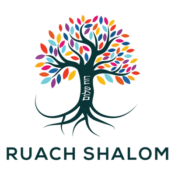In the late 1990s I spent ten years with Rabbi Yehuda Aschkenasy z.l. in a lern-group with people of the post-war generation, with many traumas passed on from our parents. He helped us look at it in a positive way and we helped each other by recognizing and acknowledging our grief.
I made reports of the meetings and quote from this what Yehuda said, among other things.
‘The collective memory of the young child’s wholeness has kept the Jewish community together. That wholeness is later broken in contact with reality. But the memory of it can be turned into trust, in yourself, in each other.
The Torah provides a guideline. An example: only man knows humanity. It is in your own heart, you cannot get it from heaven. It is shaped by the Ten Commandments, the Sabbath, the prayers. They are humane, not so much religious principles. Such as: man can always choose the right.
Yehuda starts from this, the potential for good. ‘You have to practice that.
You have to address the healthy part of yourself, that can restore the balance.
The disability cannot be cured, but you can learn to live with it. It takes years of struggle. But you can learn that people care about you, that people need you.’
Healing and trust are difficult words. But over the years, the lerngroup has increasingly become a group that shared emotions with each other and therefore started to trust each other. After we stopped because Yehuda got too old, contact with a number of people has diminished. Everyone went their own way, but everyone took something from all those wise lessons.
I now realize how special this group was. Have I ever been in a group where there were not at a certain moment the irritations, the arguments, the anger? Always following those old patterns, not realizing that they can be broken, that we can see that they have been passed on unconsciously by previous generations and make our lives incomplete without harmony and trust.
How many broken families, how much alienation between parents and children, and children among themselves? And also in groups.
And Yehuda has tried to teach us how to deal with it, over and over, with endless patience. Practice, practice, he says, it is a learning process.
Recognizing and acknowledging this, we can ensure that our chavura Ruach Shalom can be a real community, by trusting each other and sharing our emotions.
